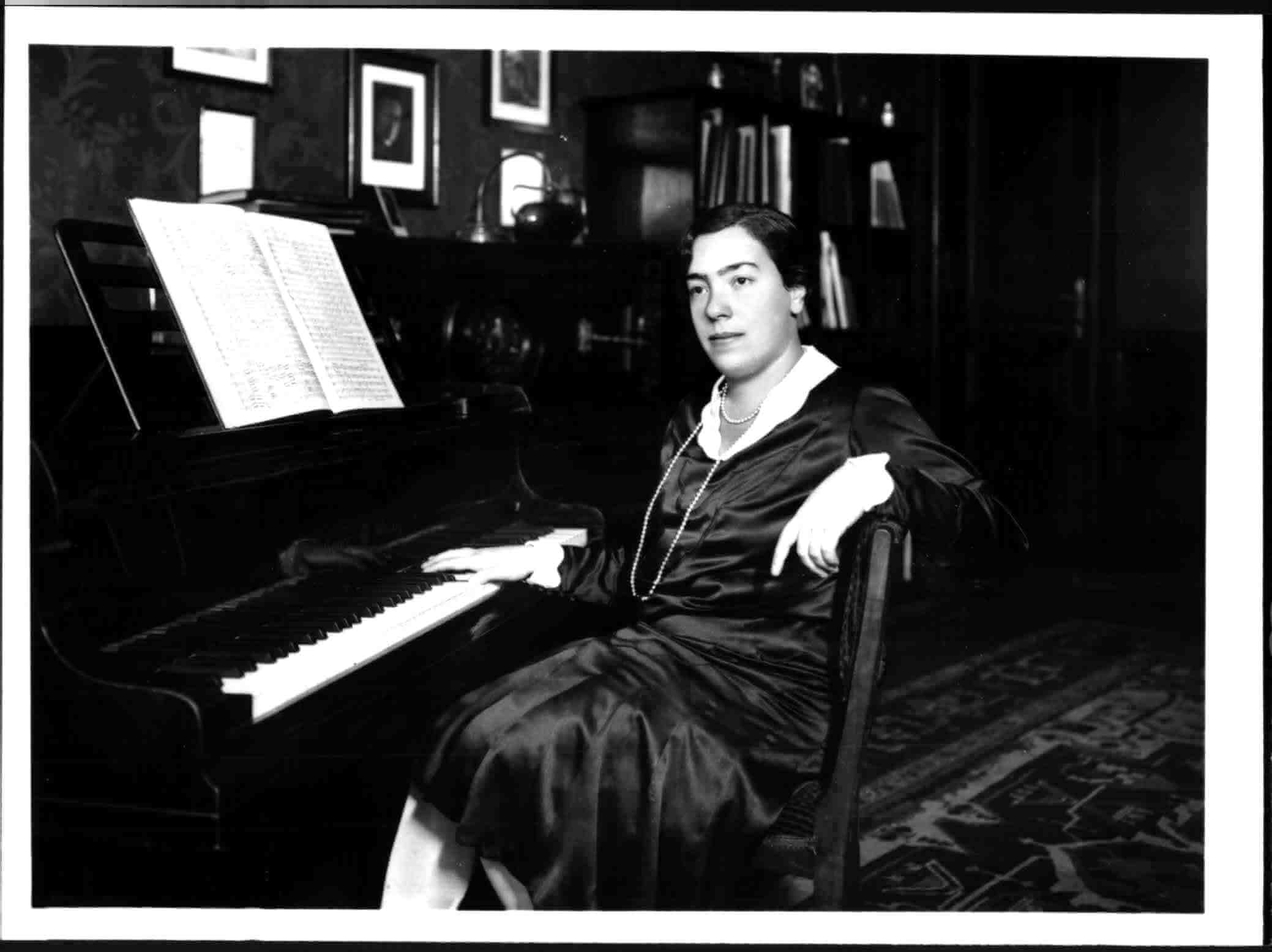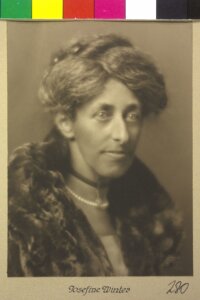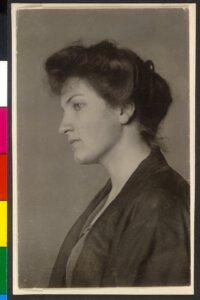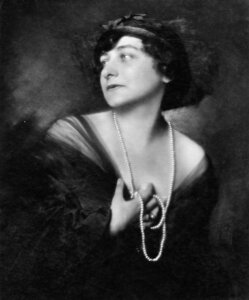Why it was dangerous in Nazi Germany to be both a Jewish woman and a composer
A new book lays out how Hitler’s thugs targeted artists such as Camille Frydan and Josefine Auspitz-Winter

Graphic by Angelie Zaslavsky
The Milken Archive of Jewish Music has worked to promote awareness of the accomplishments of such American Jewish women composers as Vivian Fine, Joelle Wallach, Shulamit Ran, Miriam Gideon and Sheila Silver. Yet their European forebears remain little known, although some 20th century European Jewish women composers spent years as refugees in the U.S. Now the Austrian Jewish mezzo-soprano Andrea Schwab, a descendent of Theodor Herzl, has published a book, “Jewish Women Composers,” with Hollitzer Verlag to celebrate the creativity of these Europeans. Recently Schwab spoke with Benjamin Ivry about their talent, ordeals and triumphs.
Benjamin Ivry: You point out that in the early 20th century, Jewish women composers were “exposed to social contempt and the reprisals of Nazi rule in three ways.” It can be especially difficult to belong to more than one despised group at a time, and many of these composers were endangered primarily as Jews. In Fascist Europe, was it more perilous to be a woman or a composer?
Andrea Schwab: I think maybe in Fascist Europe, it was dangerous to be both. Maybe even more so for composers because that was kind of seen as sort of outlandish and exotic and of course, the Nazis had strong ideas about how a woman should be and how a man should be. Even earlier, in Germany during the reign of Kaiser Wilhelm, they said the women’s domain should be children, kitchen and church. And that was in the pre-Nazi era.
Some of the musicians you discuss are sometimes posthumously classed as Holocaust composers, but would they have liked being associated with the manner of their inadvertent death? After all, Anton Webern is never categorized as a composer shot and killed by a U.S. Army cook, although that’s how he died, and no one calls Franz Schubert a syphilis composer.
I wouldn’t call them Holocaust composers. The topic I chose was Jewish women composers because in Vienna, National Socialism happened, so for me it was necessary to give a name to their lives, to write about their lives and make it understandable how difficult their lives were — to make their music known. It was extremely challenging for them. Writers often discuss the ordeals of male composers from between 1933 and 1945, but rarely speak about women composers in exile.

Some composers from wealthy families, like Josefine Auspitz-Winter, who was murdered in Theresienstadt, and especially Mathilde von Rothschild, supported Jewish and non-Jewish philanthropic causes to avoid accusations of partiality. Rothschild founded a Jewish Children’s Home and other charitable institutions. Isn’t such social consciousness rare among male composers? Why did Jewish women composers have such unusual social awareness?
I think Josefine Auspitz-Winter and Mathilde von Rothschild grew up in prosperous families with the example of their parents, who were very socially aware. At the beginning, Auspitz-Winter was brought up to do charity work, so it was normal for her to try to combine helping society with being creative. This is a very interesting question. Maybe Jewish women composers had a wider view of what was possible to do in life, developing artistic gifts while improving the world, unlike male composers, who just devoted their lives to music.
The English soprano Charlotte de Rothschild has recorded Mathilde von Rothschild’s songs, and in CD booklet notes, describes them as “pushing the boundaries” of musical conventions of her day with a “depth of feeling and pathos well beyond the parlour songs of her contemporaries.” What’s wrong with just capturing the historical aura of a musical salon or bourgeois household with winsome, insinuating, coquettish melodies? Must music have avant-garde pretensions to be considered prestigious?
I think you’re right and music is music. Mathilde von Rothschild wrote a lot of beautiful songs. Perhaps people are afraid that someone may say that something is kitsch. For a long time, people were worried that if something that wasn’t avant-garde appealed to them, they might be seen as unfashionable.

Alma Mahler was noted for her antisemitism, telling one suitor, the Jewish composer Alexander Zemlinsky, that she could never marry him because it would mean bringing “short, degenerate Jew-children into the world.” One biographer describes how she referred to another lover, Franz Werfel, as a “short, ugly, fat Jew” and at formal dinners, would shriek at him: “Don’t forget, I’m not a Jew!” In her diaries, Mahler mentions being subjugated by the “kindly, soft eyes” of Adolf Hitler. When she was old, Alma refused to accept a doctor’s diagnosis of diabetes, because she considered it a Jewish disease. So is Alma Mahler in your book because of her liaisons with Jews?
I expected that question. Because first of all she was connected to this period, she was together with Gustav Mahler who was a Jew, and with Werfel, also of Jewish origin, following him to the United States in exile. She was connected to this music and she was a fantastic composer. And also linked to her female essence. She had so many men. But Alma Mahler was not only a femme fatale; she was very intelligent and clever. Gustav Mahler first stopped her from composing but decided to encourage her because Sigmund Freud told him to. At the time, many gifted women had family and social obligations. Going out dancing all night did not leave time for serious composing. Instead of studying, gifted women focused on enjoying themselves in society.

The Jewish composer Camille Frydan wrote a schmaltzy melody that was performed in English as “One Kiss for Tomorrow” that fits into the swing music era. As she was born Camilla Herzl, was she related to your ancestor Theodor Herzl?
My grandmother was Alma Herzl and my great-grandfather was Isidor Herzl and he was the direct cousin of Theodor Herzl. Theodor Herzl had no direct descendants, so I don’t know whether Camilla Frydan was related to our family. But we have so many relatives spread throughout Europe that it might be.
Your ancestor Theodor Herzl was criticized by literary historian Mark H. Gelber for having “fundamentally sexist views on the nature of women, in general.” Would Herzl, who claimed to be inspired by listening to Wagner’s “Tannhäuser” when writing “The Jewish State,” have accepted that Jewish women could be wonderful composers, or was his view of musicianship too macho to accept that possibility?
[Herzl] died in 1904 and it was a completely different time. I don’t know, but can only feel or guess instinctively that he would have thought that the subject of Jewish women composers has nothing serious about it. That’s likely the way he was. In those days, women were seen from a completely different point of view. In some families, women were only starting to be allowed to study at university, so I presume Herzl probably might have not approved of Jewish women composers. If he had met an outstanding successful Jewish woman composer, it might have been different, but I guess he didn’t. When Herzl met [the Austrian novelist and Nobel-prizewinning peace activist ] Bertha von Suttner, he got along with her.
















